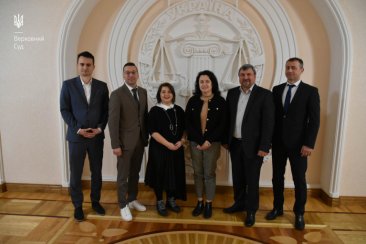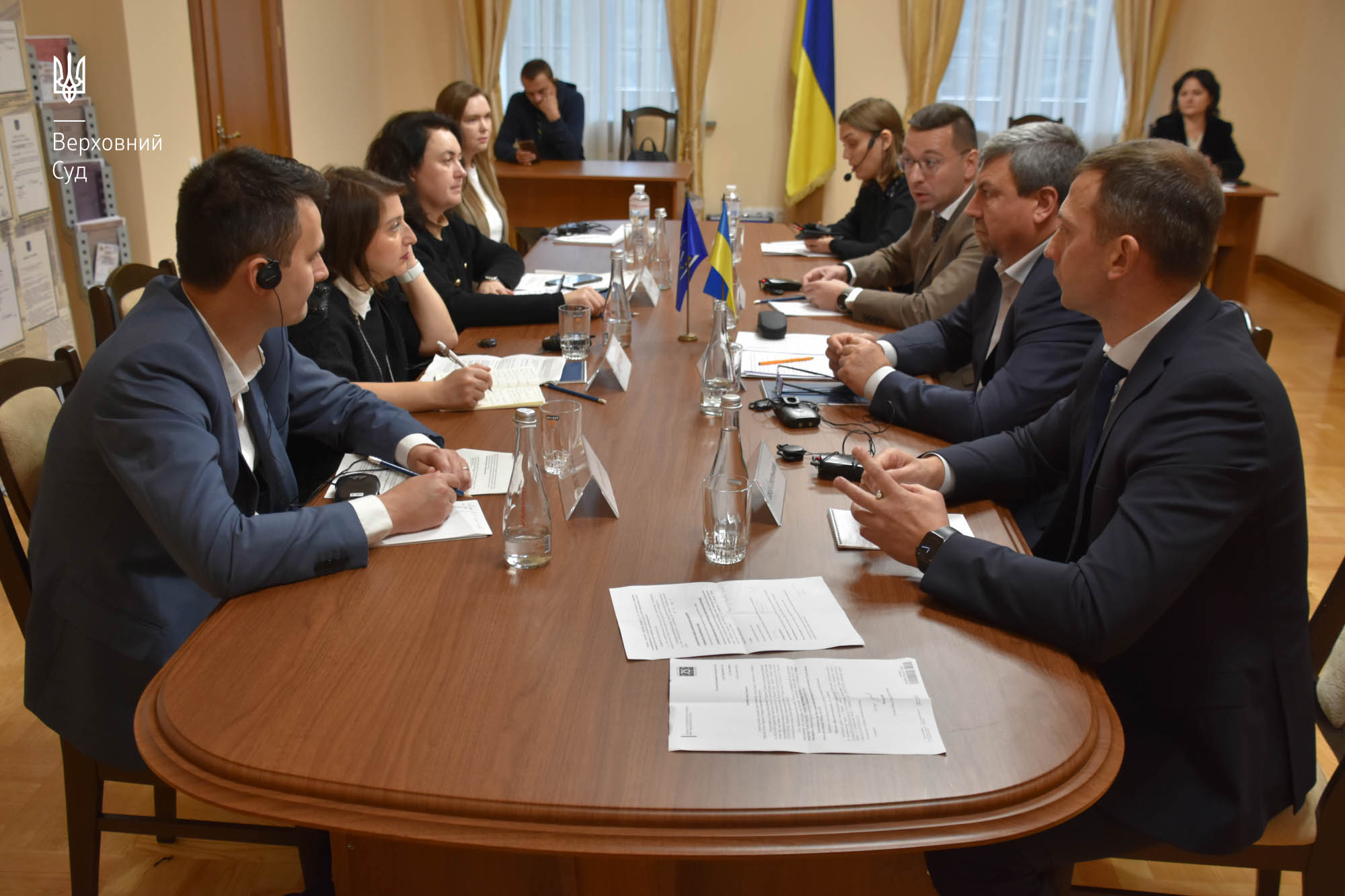Contact center of the Ukrainian Judiciary 044 207-35-46

The President of the Civil Cassation Court within the Supreme Court, Borys Hulko, said this during a meeting with the Head of Cooperation Projects Unit of the Children Rights Division of the Council of Europe Headquarters in Strasbourg, Zaruhi Gasparyan, the Head of the Council of Europe project ‘Protecting the rights of Ukrainian children during and in post-war context’ Olha Kalashnyk and the Project Manager Ovidiu Majina. The meeting was also attended by Supreme Court judges at the Civil Cassation Court Yevhen Synelnykov and Pavlo Parkhomenko.
The Council of Europe delegation informed about the activities of the project ‘Protecting the rights of Ukrainian children during and in post-war context’ in recent years, outlined the priorities and activities carried out under the project in 2023-2024, and possible project priorities and activities for the next period (2025-2027). In particular, Zaruhi Gasparyan said that work is underway to prepare recommendations to ensure the best interests of the child in disputes involving children. The results are expected at the end of this year or early next year. Olha Kalashnyk added that this year, at the request of the Ministry of Justice of Ukraine, a comprehensive analysis of draft legislation on child-friendly justice is being carried out as part of the project ‘Protecting the rights of Ukrainian children during and in post-war context’.
Borys Hulko spoke about the Cassation Court's consideration of cases involving children. The President of the SC CivCC noted that the number of such cases has increased this year compared to last year. In 2023, the CivCC of the Supreme Court considered 7 cases on the return of children from abroad, this year there are already 30 such cases (22 cases have been considered, 8 are pending). Last year there were 19 cases of removal of a child from one of the parents, this year there are 45 cases (33 have been considered). The most numerous category of cases is the determination of the child's place of residence: last year 120 such cases were pending before the CivCC of the Supreme Court, this year 140 such cases have already been considered and 41 cases are pending. "This means that the dynamics are such that the number of cases related to children's upbringing is growing and significantly exceeds the pre-war period," says Borys Hulko.
The judge also noted that the problems faced by the courts of first instance and appeal in dealing with such cases are mainly related to the lack of staff, the inability to ensure full consideration in courts located close to the combat zone, and procedural problems caused by the war (for example, the inability to notify a parent who has gone abroad with a child of the consideration of the case, etc.).
Borys Hulko informed that this year the CivCC of the Supreme Court held a number of technical meetings with representatives of the United Nations Children's Fund (UNICEF) in Ukraine, the Interagency Coordination Council on Juvenile Justice (a temporary advisory body of the Cabinet of Ministers of Ukraine), and the NGO Ukrainian Public Center “Volunteer”. The meetings were primarily focused on the issue of judges' specialisation in disputes concerning children. As a result, the CivCC of the Supreme Court co-organised a pilot project to introduce the specialisation of judges in family and children's matters(http://surl.li/qdwexb).
Also, on 28 November 2024, the CivCC of the Supreme Court is planning to hold a seminar to provide methodological assistance to judges in organising the consideration of cases involving children.
The President of the CivCC of the Supreme Court noted that the category of disputes concerning children is very complex, so it is important to train judges, especially those of the first instance. In addition, it is necessary to hold training events for lawyers, representatives of guardianship and custody authorities, and experts. Another problem is the low level of legal awareness of the population about their rights and, most importantly, their responsibilities towards children.

Yevhen Synelnykov outlined the challenges faced by judges in non-criminal proceedings involving children. The main problems are staffing and excessive workload. There is also a problem with the lack of reasoning behind the conclusions of the child welfare authorities. The court can gather evidence itself if it is necessary for the protection of the child, but obtaining an expert opinion usually requires money and additional time. The judge noted that a project is currently being implemented in Ukraine, with the support of foreign partners, to involve psychologists and experts in criminal proceedings involving children. Therefore, it would be advisable for the court to have the possibility to involve an expert or specialist in civil proceedings and to obtain an appropriate opinion on the family situation.
Yevhen Synelnykov stressed the need for interdisciplinary cooperation in children's cases and the use of mediation.
He also said that divorce cases in Ukraine can be considered in a simplified procedure and all issues related to children are usually resolved separately. In European countries, family disputes are usually resolved in a comprehensive manner by family judges. Therefore, it is advisable to consider the possibility of resolving such disputes in the same way in our country.
Regarding specialisation, the judge noted that it has already been introduced in the Izmail District Court of Odesa region (since 2006), district courts of Donetsk and Dnipro regions. The Supreme Court judges promote the idea of such specialisation at trainings for lower court judges and other events.
In addition, Yevhen Synelnykov said that the court resolves family disputes using flexible approaches, assessing the interests of the child in each case. In particular, the CivCC of the Supreme Court has introduced the model of joint parental custody of a child, which is already used by lower courts. And recently two draft laws were registered in the Verkhovna Rada of Ukraine providing for the regulation of the model of joint parental custody at the legislative level (Reg. No. 12123 of 15 October 2024 and Reg. No. 12132 of 16 October 2024).
Pavlo Parkhomenko noted that the Supreme Court applies the CoE principles of child-friendly justice in its practice. In many decisions, the Court refers to EU guidelines or procedures as a source of law. The implementation of European approaches in national case law is very important. The Supreme Court judges also promote the application of the relevant principles in the training of lower court judges.
Pavlo Parkhomenko drew attention to the problem of enforcing court decisions in cases involving children. It needs to be addressed both at the legislative level and in practice. A generalisation of practice and a study of the causes and possible solutions to the problem may be useful. The relevance of the issue is demonstrated by the decisions of the European Court of Human Rights on the relevant issues.
The judge spoke about the experience of the judicial system in cooperating with international partners in criminal proceedings involving children. He emphasised the importance of such cooperation in civil justice. In particular, attention should be paid to the issue of involving experts and psychologists in civil courts in cases involving children. Pavlo Parkhomenko said that today there are already psychologists trained to participate in criminal proceedings and it is important to organise training for such specialists to participate in civil cases. It is also important that judges, lawyers and participants in the process know how to use psychologists' conclusions correctly.
For reference. In accordance with the Council of Europe Action Plan for Ukraine ‘Resilience, Recovery and Rebuilding’ for 2023-2026, the CoE Office in Ukraine has been implementing the project ‘Protecting the rights of Ukrainian children during and in post-war context’ since 1 January 2023. This project is a direct follow-up of the previous CoE projects ‘Combating violence against women and children’ (2017-2018), ‘Combating violence against children in Ukraine, Phase II’ (2020-2021) and ‘Combating violence against children in Ukraine, Phase III’ (2022).